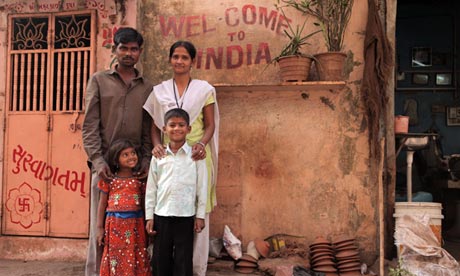Why are our attitudes to poverty at home and abroad so different? {uk}
http://www.guardian.co.uk/commentisfree/2012/oct/12/poverty-india-uk-welfare-ian-jack
The BBC's Welcome to India series inspires awe as much as pity for India’s struggling urban poor, writes Ian Jack. Photograph: BBC/Keo Films
The soundtrack to Tom Beard's three-part BBC documentary, Welcome to India, is eclectic beyond reason. In Wednesday's second film I thought I heard Django Reinhardt, Nino Rota's theme for Fellini's Amarcord, and a burst of a famously jaunty little number from the 1958 Bombay movie, Howrah Bridge, which I happen to know and like. The previous week's instalment might even have included a Sousa march. At first the mixture seems too much – too intrusive, as though the intention were ironic, like Vera Lynn singing We'll Meet Again at the end of Dr Strangelove. But then you adjust to its shared quality, which is cheerfulness. This is the new soundtrack to scenes of poverty and human struggle.
Forty, 20 or even 10 years ago, it would have been impossible to match this music to these pictures. Beard's films follow the stories of individuals who are battling to make a living in the overcrowded squalor of the big Indian cities. In Mumbai, a couple sell hooch from their beach shack, part of a ramshackle slum that's forever being threatened with demolition by the civic bulldozers. In Kolkata, a young man goes down into the drains under the jewellery quarter to scoop up the black mud that contains tiny particles of gold; a gold smelter with a little riverbank factory buys the mud in dozens of sacks and eventually – after days of panning and chemical treatment – extracts enough gold to make a disc the size of a 10p coin. Even to people who imagine they know India, some scenes are unforgettable. I still feel queasy at the memory of Ashik, a Kolkata Muslim who earns a living by rendering beef fat to tallow: stirring the fat in a giant wok over a hot fire, defiantly chewing a piece of hot gristle as the maggots crawl over the heaps of still-to-be-melted animal parts that lie in suppurating bags outside his hut.
These are extreme sights that need no heightening by music, now or at any time, but elsewhere in the films more routine scenes of hardship would once have had a sitar for company – twanging reflectively and even a little mournfully – because though the people in them aren't the poorest in India (in one or two cases far from it) they are still, to western eyes, impoverished and so deserving of music that reflects our concern about their plight. Or that at least would have been the case, up to the point where the urban poor of India began to be seen in a new way: no longer as a pitiable generality, resigned to their misfortune, but as individuals who are resourceful, ambitious, inventive and hugely hard-working. All those words, or adjectives like them, crop up in Welcome to India's scripts. So throw away those soulful sitars! Django's stomp and the brass band's blare make more sense on the march to self-improvement.
The way poverty is seen hasn't been so transformed since the Victorian age, when the Malthusian idea that the poor and the hungry deserved their fate gave way to a kinder philosophy that saw them as innocent victims. Newspapers as well as novelists played a part in this change, but it was a gradual achievement rather than a knockout victory for Oliver Twist. As James Vernon writes in his excellent Hunger: a Modern History, not until the late 19th century "did hunger become a humanitarian cause célèbre". A new kind of journalism established human distress, especially abroad, as a staple of certain British newspapers. India could provide it. A Reuters correspondent, Francis Merewether, toured the country with a camera during the 1896-1898 famine, and, as Vernon writes, "opened the floodgates to a new genre of famine photography that made a spectacle of suffering and turned the viewer into a voyeur".
renate
(13,776 posts)Via that link, I found a story about the documentary "Slumming It," which I'm watching right now on YouTube, and it's a look inside the slums of Mumbai that I've never seen before. Thanks so much!
sad sally
(2,627 posts)politician in the last 30 years or so to really talk about poor people and poverty in the USofA.
The Streak Continues: 2008–12, Will Anyone #TalkPoverty?
by Greg Kaufmann
There are 46 million people living in poverty—on less than $18,000 a year for a family of three. 20 million live in deep poverty—surviving on less than $9,000 annually for a family of three. And there are now over 16 million children in poverty—22 percent of all kids—making them our nation’s poorest age group.
Given these horrific numbers, it is stunning that neither Jim Lehrer nor Martha Raddatz deemed poverty to be an issue worth talking about in the first two debates of the presidential campaign.
I would imagine that it’s not just antipoverty advocates who are disappointed in the lack of real discourse about this issue. In January, a poll conducted for Spotlight on Poverty—an initiative of major US foundations to foster debate on poverty and opportunity during the campaign—revealed that 88 percent of likely voters said a presidential candidate’s position on poverty was “important” in determining their vote; nearly half said it was “very important.”
Still, the blame doesn’t lie entirely with the moderators. Just as there were plenty of opportunities for President Obama and Governor Romney to address poverty in a substantive way last week, the same was true in last night’s vice presidential debate.
http://www.commondreams.org/view/2012/10/13-2